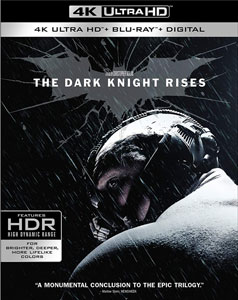“The Dark Knight Rises” is a worthy capper to Christopher Nolan’s Batman trilogy, including all of the pluses that make these films beloved by their admirers but also all of the minuses that keep cynics like me from totally embracing them.
Like the first two entries, “Batman Begins” (2005) and “The Dark Knight” (2008), “Rises” uses its chess pieces — new ones this time are enemy Bane (Tom Hardy) and ally Selina Kyle (Anne Hathaway) — in ways that respect the source material while also offering grounded, non-campy interpretations of the characters. Few would argue that these characters are richer than the last time we saw them — Selina in 1992’s “Batman Returns” (2004’s “Catwoman” was technically a different Catwoman) and Bane in 1997’s “Batman & Robin.”
Hathaway a fetching addition
Hathaway is fetchingly watchable in the role, although there’s a bit of a sense of “been there, done that” as with the Two-Face arc in “The Dark Knight.” Bane has a bit of the opposite problem: Hardy and the writers give the character a lot more gravitas than the last film incarnation, certainly, when Bane was merely Poison Ivy’s lackey — and they give a nice nod to the comics during one key fight with Batman — but I didn’t remotely understand why and how Bane acquires so many followers.

“The Dark Knight Rises” (2012)
Director: Christopher Nolan
Writers: Jonathan Nolan, Christopher Nolan, David S. Goyer
Stars: Christian Bale, Tom Hardy, Anne Hathaway
In “Rises,” Bane sets about “liberating” Gotham City (his version of liberating being ruling via dictatorship, it seems). There’s a lot of talk about how the police force’s clean-up of the crime syndicates, boosted by Harvey Dent’s martyrdom, is all based on a lie (Dent actually wasn’t such a great guy, but that was overlooked when Batman supposedly murdered him in the last film).
But so what? If bad guys are behind bars and crime has gone down and people are happy, what’s the problem? We don’t see many of the average citizens of Gotham in “Rises,” but generally, they seem to be doing fine, hardly a pot of revolution ready to boil over.
If Nolan — who co-wrote the film with his brother Jonathan — wanted to portray Gotham City as a bastion of police oppression, he fails. I’m not saying that’s the message he was aiming for, but I am saying that I’m not clear on what the movie’s theme is.
Another detail I didn’t understand was Batman’s imprisonment: The prison is tied into mythology that dates back to “Begins,” but it doesn’t tie in neatly. Granted, my confusion could perhaps be cleared up by a simple re-watching of the saga, but that’s another thing I have an issue with: I don’t think these films are quite good enough to pore over multiple times.
Batman the often-absent center
Interestingly, Batman is absent from a large chunk of “Rises,” but that’s not necessarily a problem. Joseph Gordon-Levitt, as one of the bajillion Gotham cops, is the audience surrogate here, along with old favorite Commissioner Gordon, definitively played by Gary Oldman. Even as the plot and the point spin out of control, these guys ground things in reality as much as possible.

“Rises” provides those little thrills of a new piece of tech being unveiled, or an old favorite returning to the game: The wide-tired Batmobile, with its bizarrely cool method of making sharp turns, is still fun to watch. Christian Bale continues to play a fine, scratchy-voiced Batman, even if the script doesn’t give him a lot to work with.
Look, I’m a Batman fan; I loved the animated series growing up in the 1990s. When it comes to stylized darkness, tidy morality lessons and colorful rogues, “Batman: The Animated Series” did it best. But I’m not sure the franchise is as well-suited to big-movie bombast.
Obviously, Nolan’s works are superior to, say, “Batman & Robin,” whose trivialization of Bane was just one of many flaws. (Along those lines, it’s kind of a shame that Nolan is stopping at three films, because I think he could’ve done justice to Mr. Freeze, Poison Ivy, Robin and Batgirl, too.)
But I don’t understand fans’ extreme passion for this trilogy. Solid blockbusters that respect the source material? Sure. Brilliant commentaries on modern society? In that regard, I think they’re more blustery than brainy.
Comments
Trevor: Bane was great, but the movie was too long and a lot of plot points and characters could have been removed. Marion Cotillard is a terrible actress.# Posted By trevor | 7/31/12 12:34 PM
John Hansen: I agree that Bane was a distinct bad guy who popped off the screen. And Cotillard was bland, although she didn’t strike me as outright terrible. My biggest question was “How did Bane immediately get so many followers?” Someone told me “Because they are criminals; they instinctively follow the new major criminal.” I still don’t know if that totally rings true. I think some of those criminals had been forced into crime due to necessity, and would’ve been happy to get back to their families. I think some were crazy, and would never follow anyone. Also, there was a suggestion of class warfare in the film. In general, these themes seemed to be just thrown at the screen, and as a result the motivations of Gotham individuals (acting as part of crowds, of course) didn’t ring true to me. Also, I didn’t understand Bane’s prison: He escaped, but left all those people there? Now those could’ve made for loyal followers, if they totally owed their freedom to him. So basically I like Bane in terms of character design, but he wasn’t remotely a sympathetic or relateable character, and he could’ve been with more thought given to his backstory.# Posted By John Hansen | 8/1/12 2:23 PM

